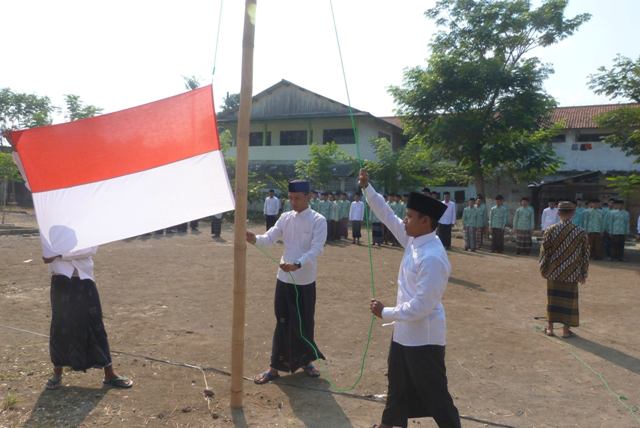Historically, pesantrens have formed a steadfast pillar of Indonesia, upholding the nation’s ideals, particularly Pancasila. While some pesantrens may diverge in understanding, pesantrens are generally formal educational institutions under the oversight of the Ministry of Education and Culture or the Ministry of Religious Affairs. Thus, santri (students of pesantren) are undeniably integral to the foundation of Indonesia.
The topic of nationalism in pesantrens is one that merits exploration, especially as nationalism sometimes calls for a test of authenticity. It is insufficient to merely voice pro-nationalist rhetoric without truly knowing the Pancasila principles. While textual knowledge might seem secondary to practical application, a contextual understanding cannot thrive without a foundational text. It is this unity of text and context that breathes perfectionist life into nationalism.

Reflecting on past experience at Pesantren Annuqayah, it was customary to hold flag ceremonies on national days, such as National Education Day, and I even participated in Paskibraka alongside other santri on Independence Day, August 17. This practice underlined the strong sense of nationalism embedded within the santri spirit. The Guideline for the Appreciation and Practice of Pancasila (P-4) was inseparable from advancing to higher levels of education, and though questioned in terms of context, it served as a foundational framework for nurturing the spirit of nationalism.
Understanding Nationalism
Nationalism is a political sentiment that unites people of the same culture, territory, and shared aspirations. According to the Indonesian Dictionary (KBBI), nationalism represents a doctrine of love for one’s nation and country. When someone grows up in a particular land, a natural instinct to defend and love it emerges as a manifestation of nationalism.
Hubbul wathan (love of one’s homeland), as advocated by KH Hasyim Asy’ari, is a guiding principle in building this nationalistic spirit. A deep awareness and commitment to defending the country must be rooted in the spirit of national unity. Sacrificing for the nation, fostering patriotism, and strengthening unity and solidarity are central to nationalism.
Ernest Renan characterized nationalism as a desire for unity and statehood, signifying a profound aspiration for national cohesion. In reality, nationalism is a collective pursuit, one that materializes through a shared commitment to uphold unity. Similarly, L. Stoddard defined nationalism as a shared belief, whereby people identify with their nation as a mutual sense of belonging. This notion emphasizes that solidarity and cooperation are crucial, for without them, a nation becomes vulnerable.
Forms of Nationalism
There are several forms of nationalism worth understanding, particularly for santri. Recognizing these forms underscores the idea that nationalism is built on various principles. Firstly, civic nationalism ensures that political rights are guaranteed to all citizens, making people the central players in governance. Secondly, ethnic nationalism grounds political legitimacy in cultural or ethnic origins. Thirdly, romantic or organic nationalism revolves around an intrinsic political bond rooted in a dynamic, reformative national identity.
Fourthly, cultural nationalism derives political legitimacy from a shared culture rather than hereditary factors like race or skin color. Fifthly, state nationalism embodies a strong nationalistic sentiment, where allegiance to the nation supersedes individual rights and freedoms. This form of nationalism often intersects with ethnic nationalism. Sixthly, religious nationalism stems from a shared faith that provides political legitimacy within a nation.
Santri and Nationalism
For santri, understanding and practicing nationalism is essential. In Islamic teachings, nationalism is a duty, backed by both rational (aqli) and textual (naqli) evidence. This highlights that national pride and loyalty to one’s nation are obligatory. Cultivating a personal identity aligned with hubbul wathan is integral to becoming a good citizen.
“Indeed, He who ordained the Qur’an upon you will return you to a place of return.” (QS. Al-Qashash: 85)
In interpreting “place of return,” scholars offer varying perspectives, with some referring to Makkah, the Hereafter, death, or the Day of Judgment. Imam Fakhr Al-Din Al-Razi, in Mafatih Al-Ghaib, supports the interpretation of Makkah as the birthplace of the Prophet. Sheikh Ismail Haqqi’s interpretation suggests that love for one’s homeland is part of faith. During the Prophet’s journey to Madinah, he often expressed longing for his homeland, and Allah granted his prayer to return to Makkah. Umar RA also affirmed, “Without love for one’s homeland, barren land would remain uninhabited; but it is this love that brings life to it” (Ismail Haqqi al-Hanafi, Ruhul Bayan, Beirut, Dar Al-Fikr, vol. 6, pp. 441-442).
This affection for one’s homeland forms the foundation of a nation’s progress. Without nationalism, a country would struggle with difficulties in all areas of life.
Nationalism and Nonviolence
Occasionally, individuals act under the guise of nationalism but behave radically. Throughout the Prophet’s life, he never used harsh or violent means, even enduring bullying without retaliation, to advance Islam with dignity and peace. Violent or radical actions have no place in true nationalism, as nationalism embodies a commitment to creating a safe, secure environment for all members of society, regardless of ethnicity, culture, or religion.
In Islam, nationalism is practical and provides a framework for creating a harmonious and inclusive society. Islam emphasizes tolerance, as captured in “For you is your religion, and for me is mine” (lakum dinukum waliyadin), a clear basis for religious freedom within nationalism.
Nationalism cannot thrive where conflict, hostility, or rivalry among citizens exists. Thus, true nationalism is expressed through promoting peace across society, and santri have a role in actively realizing nationalism, shaping a unified nation that is, in essence, baldatun tayyibatun wa rabbun ghafur—a prosperous land under Allah’s forgiveness. Wallahu A’lam.









Ajiib
Syukron,,,